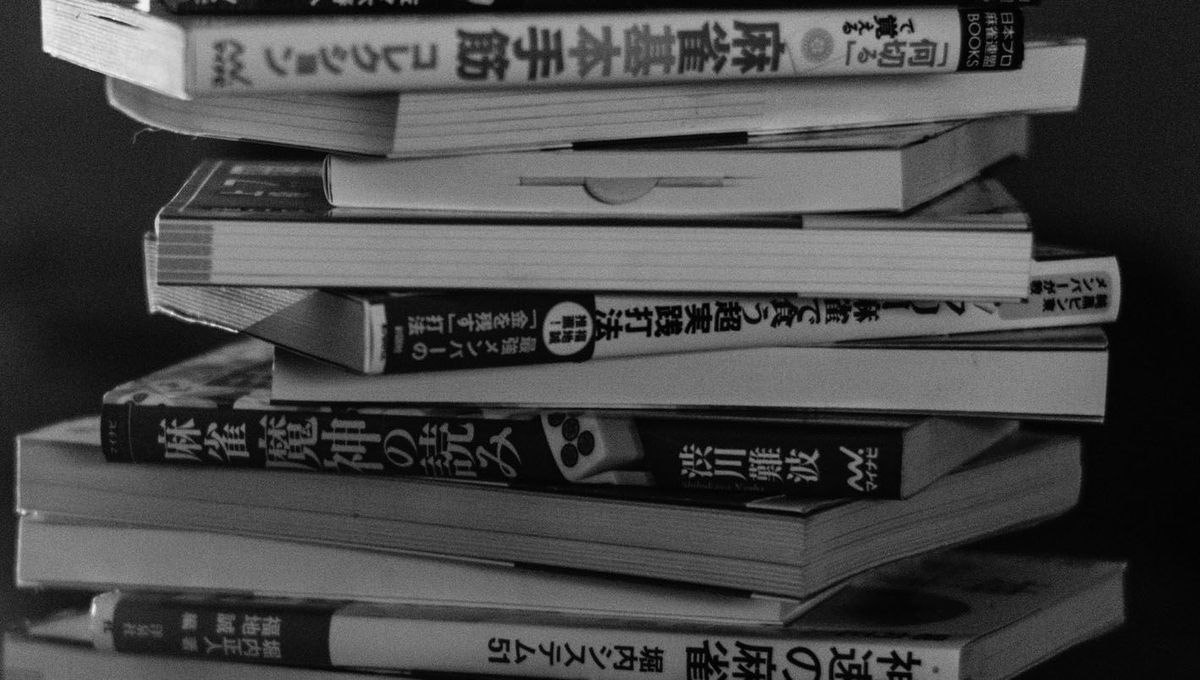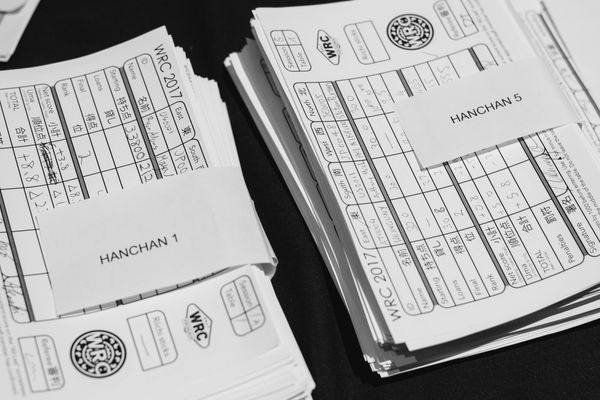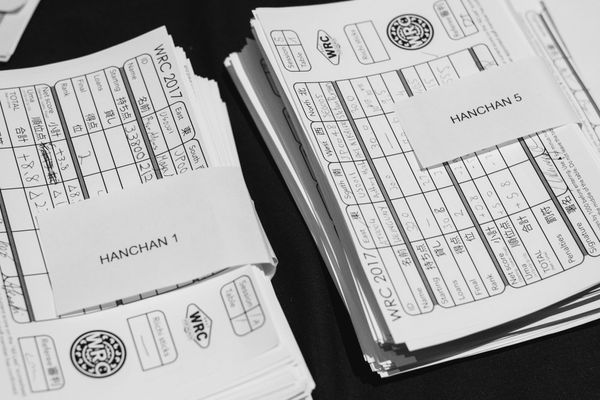Yaku, Hai!: Riichi (& Ippatsu & Daburu Riichi)

In order to be able to build the best hands, you need to know both how to plan out your play with a hand, and how to execute that plan. This is the essence of hand development: taking that group of 13 useless tiles you start with, and using them to build a tenpai that wins you the game. In riichi, you are constantly confronted with choices like "Do I open my hand?", "Do I just try to get to tenpai quickly, or am I okay with a slower, more valuable hand?", and the ever-important "Do I fold?" The yaku are basically your toolbox of techniques to build hands, so understanding each of them is critical (especially in games where they contribute more to scoring, like when playing without open tanyao or red fives).
This is the first article in Yaku, Hai!, a new series of articles which go into detail on each of the yaku in turn, explaining the rules surrounding them, when you would use them, and the nuances which may not be apparent at first glance. This first article covers the single most important yaku: the titular riichi. We'll also cover riichi's brother double riichi and cousin ippatsu, since their the strategy is simply a part of riichi's.
Riichi is simple on the surface: stay closed, get tenpai, declare riichi, profit! But both the rules and strategies are very complex, making it one of the most difficult yaku to master. Riichi is one of the best reasons to stay closed until you hit tenpai, but that's not all. There is an incredible amount of strategy that goes into the decision of when to riichi or not, and there is far, far more than one article's worth to say about it.
When to Declare Riichi?
Riichi is a unique yaku because of its intricate link with the riichi declaration. As should be taught to any player when they learn the game for the first time, you may declare riichi when you discard a tile, if your hand is closed and you are tenpai. This costs 1000 points, which are put into the middle of the table as a bet. At that point, you lock your hand in. You must just discard every tile you draw, unless you can win (or call kan) off of it. The actual yaku is awarded to your hand after your declaration.Any time you have a closed tenpai hand, you have the ability to declare riichi, but you can also stay closed. This is called damaten, and it carries with it advantages and disadvantages. There is no simple answer to the question "Should I declare riichi?" In order to answer this question, you have to take in many of the factors that go into normal play decisions, such as the quality of your hand, the overall game situation (score and round).
There are four main drawbacks to riichi:
- You can't defend
- You can't improve your hand
- Your furiten doesn't expire, meaning you can't target a specific player
- Your opponents will defend, making them less likely to deal in
- You have to bet 1000 points
- When your opponents defend, you are more likely to tsumo
- You can set traps for defending opponents
- You get a yaku worth 1 han, or 2 han in case of daburu riichi
- You might get ippatsu and/or ura dora for additional score
Drawbacks
Inability to Defend
Once you have declared riichi, you have almost no decisions left to make. In particular, if you draw a dangerous tile, you are forced to discard it, and that can be very bad! You should not riichi if you are in a situation where you should be defending, or where there's a real risk that you might have to start defending.If you can very clearly see a strong hand like in your opponent's tiles, ask yourself whether there's any tile you could draw that would make you abandon your hand, like a 5 in a suit when someone looks to be pushing chinitsu, the third dragon after seeing an opponent call the first two, or any dora tile. If there is, then you have to bear in mind that if you declare riichi, you may well draw that tile and deal in.
This is also the biggest reason not to declare an oikake (chasing) riichi—a riichi after another player has already declared riichi. You know for sure that they are in tenpai and think their hand is worth riichiing on. You should only chase if you think that your hand is faster or bigger than the first riichi, preferably both, or else if you're in a points situation where there is no reason to defend.
When you're evaluating the effect of riichi on defense, pay careful attention to the dora tiles. You should always know how many dora are unaccounted for, and having a good idea where they are can have a huge impact on your hand. Declaring riichi on a small hand is a lot safer if you know you aren't risking dealing into tanyao dora 4.
Inability to Improve your Hand
The other aspect of the lock-in is that you can no longer improve your hand by giving you more points or a better wait. Especially with small hands, it is sometimes worth it to wait for another tile to make the hand better. Some common examples include:- Shifting a sequence sideways:
Example:












 Draw:
Draw:  Dora:
Dora:  In this case, replacing the
In this case, replacing the 

 sequence with
sequence with 

 by discarding
by discarding  adds 3 han to the hand (tanyao, iipeikō, and a dora) without changing the wait. If the hand didn't already have
adds 3 han to the hand (tanyao, iipeikō, and a dora) without changing the wait. If the hand didn't already have

 , it would get sanshoku (but not iipeikō). Situations as extreme as this are rare, but each individual possibility arises every now and then.
, it would get sanshoku (but not iipeikō). Situations as extreme as this are rare, but each individual possibility arises every now and then. - Changing a kanchan wait into a ryanmen:
Example:












 Draw:
Draw:  Discarding the
Discarding the  improves the wait from
improves the wait from  only to
only to 
 , and it also adds pinfu to the hand.
, and it also adds pinfu to the hand. - Replacing a regular five with a red five.
- Changing a pair wait.
Second, how many tiles are left which could improve your hand? If only one tile is left, but you already have a good wait, you're far more likely to just win by tsumo than actually improve your hand, which means that there may not be much point to waiting. On the other hand, if you are on a hellwait kanchan and there's four tiles left that could let you get a better ryanmen, then maybe you should consider holding off.
If you have a pair (tanki) wait, then you have an extremely flexible wait. Any tile you draw can be used as a wait, so you can hold off until you have a wait that's either likely to win or has a dora. This comes up especially with chiitoitsu, where it is often correct to riichi on a dora wait but not otherwise.
Third, how much better is the hand for you if you do draw the tile you want? This can be both score- and waits-wise. If you already have a strong enough hand, you don't need to improve it. If your hand is already 4 han, adding a 5th doesn't add much value. If you are trying to improve a kanchan like ![]()
![]() to a ryanmen like
to a ryanmen like ![]()
![]() , this doesn't actually increase your chances of winning by very much if there's only one
, this doesn't actually increase your chances of winning by very much if there's only one ![]() left.
left.
Inability to Target
Once you riichi, if you pass on a winning tile, then you are furiten for the rest of the hand rather than until your next turn. The consequence of this is that you can't target a single player.It's rare that you are specifically trying to target a specific player, and you'll be more than happy to win off of anybody to inflate your own score. There are occasions, however, where you may be trying to aim for someone in particular: you may need to ron off of them to pass them, or you may want to lower their points to make them fall behind another player in a tournament.
In this case, you may want to hold off on your riichi and damaten, or you might want to risk having to pass on the winning tile and become furiten. In a worst-case scenario, you might be tenpai with as hand that's just good enough to pass the next player if you ron off of them after riichiing, but not if you tsumo or don't riichi. Sometimes you have to just accept the risk.
If you're playing with physical tiles, also watch out for another player making a shouminkan (added kan). You should already be well aware of the possibility, because you will have riichiied when that player already a call of one of your waits, but don't let it pass up. If you fail to ron them, not only will you be missing the opportunity for a rare chankan, but you are also sent into furiten. Not good!
Opponents will Defend
The common wisdom is that once an opponent declares riichi, you should probably defend. It's so common for a good reason: it's very solid advice. Flipping this around, though, this means that when you declare your own riichi, you should expect at least one and often all three of your opponents to start defending. Even if they don't out-right fold, they may slow their hand down to avoid dealing a more dangerous tile.The effect of a riichi on opponents is generally most pronounced the later in the hand, especially against stronger players. Early in the hand, the lack of information means that your opponents are more likely to simply ignore the riichi because they can't defend anyway. As you get later in the game, players have more information to defend with and less time left to build their own hands, so they're more likely to fold. Watch out, though, as waiting until later does give your opponents more time to assemble a hand, and if their hand is strong, they may push against your riichi simply because they think their hand is worth the risk.
Whether opponents start defending also depends a lot of the circumstances of play and your opponents' style. The better you know your opponents, the better you can guess whether a riichi will have the effect on them that you desire. A player well in first is likely to fold at the first sign of trouble, while a player with nothing to lose will probably push as far as he can.
The negative consequence of opponents defending, and the most pronounced, is that they are less likely to deal in to you. If you don't announce riichi, it can be far more difficult for your opponents to identify that you're tenpai. If you have a big hand (definitely any haneman or better hand, and most mangan hands), then you don't need riichi to get a lot of points from the hand. This is by far the most compelling reason to damaten with such a large hand.
You Bet Points
This is another comparatively minor drawback, except for when it really matters.Early on in the game, the 1000 points are not very relevant, but they should still discourage you from making really cheap, weak riichis. Is it worth it to spend 1000 points for a chance at winning 1000 or 1300 points? Probably not.In a tight game, on the other hand, this can be extremely relevant. You may lose a position just by the very act of declaring riichi. You also have to watch how your bet will affect others' play. By making your bet, you also increase the value of your opponents' hands by 1000 points, which may be enough to save a player who needs 2700 points but can only put together a 2-han hand. Suddenly, their worthless hand has become viable! Even worse, if they're trying to pass you, even a 1-han hand is now enough: you've lost 1000, and if they gain that back by winning, that's another 1000 points to bring the difference to 700.
It's worth noting that if you deal in with your declaration tile, you don't pay the points. Additionally, if you're playing with tobi (bankruptcy), then you usually can't declare riichi if that would bust you. Try not to get into that situation. You're already losing, and now it's even harder to recover.
Benefits
Opponents Less Likely to Win
Opponents who are defending are, of course also less likely to win. This effect is not so significant that it outweighs the drawback that opponents are less likely to deal in, but it does help you defend a tsumo. If, for some reason, you want to win a hand by tsumo—maybe you're furiten, or you want to get sanankō or even sūankō—then opponents who are less likely to either win on their own or deal into you make it far easier to get a tsumo. Early riichis can benefit a lot from this: a double riichi on a two-sided wait has an over 70% chance of getting a tsumo by the end of the hand, if all of the winning tiles are still alive when you riichi.If you're sat as dealer, you have extra incentive not to let your opponents win. You want to get the renchan, and you pay more points if an opponent tsumos. Your opponents are also more likely to defend against the threat of a dealer riichi, improving your chances.
You can Set Traps
There's also one advanced way to turn around and try to gain benefit from defending opponents: you can set traps. The classic example is to set a suji trap: riichi on, say,Setting traps well requires knowing the metagame you're playing in, because they only work if your opponents don't see them coming. Against more advanced players, the tile(s) that are suji to the riichi declaration tile are considered unsafe by skilled players, and with good reason. But you may also be able to use this knowledge against them to discourage them from dealing tiles which are safe against you.
You get a Yaku
The most basic benefit of riichi is, of course, that it is a yaku. It is worth 1 han, except when you make it on the first turn (and before anybody calls), in which case it's called daburu riichi (double riichi) and is worth 2 han. For weak hands, this is the primary benefit of riichi. Riichi can make any yakuless closed hand winnable, and it will double the value of a 2 or 3 han hand.For stronger hands that are already near-mangan or better this is a less significant benefit. If your hand is already 4 han, adding riichi doesn't help at all if you play with kiriage mangan, and only adds 300 points if you don't. A 6, 8, 9, or 11-han hand gains no benefit whatsoever from an additional han. If you really need more points, you could decide to riichi one of these hands and hope that the addition of tsumo, ippatsu, or an uradora will bump you up to the next bracket. If you don't, however, you should probably consider just staying damaten.
Of course, the above doesn't apply if your hand is full of dora and you have no other yaku. Riichi away!
You get to Gamble
Possibly the most fun part of a riichi is the bonus points. These come in two flavours.The first is ippatsu. Ippatsu is awarded any time you win on a riichi up to and including your next draw after declaring. If another player makes a call before you win, however, then you don't get ippatsu. It's worth noting that ippatsu does combine with chankan if an opponent tries to make a shouminkan, but doesn't combine with rinshan kaihou if you kan after your next draw.
There isn't really much strategy around getting ippatsu, other than be lucky. About the only control you can exercise is trying to discard a tile that's less likely to get called when you make your riichi declaration. It's also rare enough that you shouldn't plan for it.
Uradora are similar in that they are pure luck, and you only have limited control over them. They work very simply: if you win after declaring riichi, you get to flip up the tiles underneath the dora indicator(s) and use them as additional dora indicators. Much of the time, they won't contribute much, but occasionally you'll get dora out of them!
Uradora are unpredictable, but a few things are worth bearing in mind. First, the tile that's the uradora indicator is not going to be somewhere else in the wall. This means that if you can see 4 of a tile, it's guaranteed not to be giving you uradora. When discarding, if you have no other basis to decide which tile to cut, cut the one less likely to be an uradora because you might just get lucky.
Second, the shape of your hand matters. If you have lots of the same tiles, then you are less likely to get uradora, but when you do, it can be devastating. By contrast, a usual pinfu hand will rarely have 3 copies of a single tile, making uradora more likely but less potentially devastating.
Third, every kan adds both a dora indicator and an uradora indicator to the game. This means that if you riichi, you get extra chances for that bonus luck. You're still not guaranteed to get it, but your odds get better with every kan. You might also get extremely lucky and get multiple good tiles, catapaulting your hand to a sanbaiman or even a kazoe yakuman.
As a result of this increased risk, your opponents are far more likely to bail against a riichi after a kan (or worse, after two), and so you can make more marginal riichis accordingly. This depends a lot on your opponents' skill, however: strong opponents, unless they are desperate for points, won't kan unless they are tenpai.
You can also kan yourself to try to take advantage of this, but this also comes with all the usual drawbacks of kanning. Still, a closed kan right into a riichi is a good way to strike fear into your opponents' hearts.
Kan After Riichi
Kanning after riichi is subject to a few special rules, which vary from ruleset to ruleset. First off, regardless of ruleset, you can never kan in such a way that it changes your waiting tiles:![]()
![]()
![]()
![]()
![]()
![]()
![]()
![]()
![]()
![]()
![]()
![]() Tsumo:
Tsumo: ![]()
Here, your waits are ![]()
![]()
![]() , but if you call kan, you lose the ryanmen wait and you can only win with
, but if you call kan, you lose the ryanmen wait and you can only win with ![]() . I know of no ruleset where this is permitted. In some rulesets, additionally, you cannot kan if it would lock in the structure of your hand even if it doesn't change your waits:
. I know of no ruleset where this is permitted. In some rulesets, additionally, you cannot kan if it would lock in the structure of your hand even if it doesn't change your waits:
![]()
![]()
![]()
![]()
![]()
![]()
![]()
![]()
![]()
![]()
![]()
![]()
![]() Tsumo:
Tsumo: ![]()
If this rule is being used, then you cannot kan here, and the reason why is quite subtle. Your waits are ![]()
![]()
![]() regardless of whether you kan or not. However, if you win with
regardless of whether you kan or not. However, if you win with ![]() , then you can view the wait as a kanchan between
, then you can view the wait as a kanchan between ![]() and
and ![]() rather than a ryanmen on
rather than a ryanmen on ![]()
![]() , with the remaining two
, with the remaining two ![]() making up the pair. If you kan, you can no longer interpret it this way. Similarly, if you have three sets of three consecutive tiles, you can't kan one of them, since then you can no longer interpret them as three parallel sequences. Tenhou does allow kans in this circumstance, but the World Riichi Championship rules do not.
making up the pair. If you kan, you can no longer interpret it this way. Similarly, if you have three sets of three consecutive tiles, you can't kan one of them, since then you can no longer interpret them as three parallel sequences. Tenhou does allow kans in this circumstance, but the World Riichi Championship rules do not.
While these cases are rare, screwing up means a chombo if you're found out, so beware!
Putting it Together
The decision to riichi or not is one of the most critical to mastering the game. If you riichi too much, then your reckless play can result in you missing big hands and dealing in more often than you should. If you don't riichi enough, your hands will be small and your opponents will win more. There is no easy guide that gives you a magical analysis on when to riichi and when to not. It all depends on circumstances, and I haven't had the time to write about them all here.For a quick example, in many rulesets, Tenhou's included, four riichis all at once causes an abortive draw as long as nobody wins off of the tile used to declare the last riichi. If this rule is in effect and you're the fourth hand, your riichi has a completely different meaning and you're not declaring to win, but to end the hand and avoid losing. On the flip side, however, that rule might give you pause before you riichi with your yakuman tenpai.
Pay attention to when you riichi, and especially when you deal in afterwards. Was that deal-in preventable had you decided not to riichi? Was the risk worth it? You aren't going to read your opponents perfectly, of course, but the whole point of the game isn't to be perfect but to bat better than average.
For now, that's all I have to say, and I hope you enjoyed my far-too-long trek through the basics of the game's most important yaku (with brief hellos to its family members). Next time, on Yaku, Hai!, we'll go from the most skill-based yaku in the game to the most luck-based: tenhou, chiihou, and renhou.
Postscript: Noten riichi
In a game played with real tiles, it is possible to declare riichi when you're not tenpai. If you do this, it's probably pretty bad. If you end up getting discovered when you reveal your hand at a draw (contrary to what you may have seen in Akagi, it's mandatory), you pay the penalty of a chombo.Under some rules, this is allowed as a (very risky) strategic move to force an opponent into defense, with you hoping that someone will put together a quick hand and win before the end of the hand. Whether or not you can do this depends heavily on the group you're playing with. In some groups, it's allowed as a strategic move. In others, it's considered cheating and you could get yourself kicked out. If you're considering it as a stratagem, I recommend knowing which in advance!



